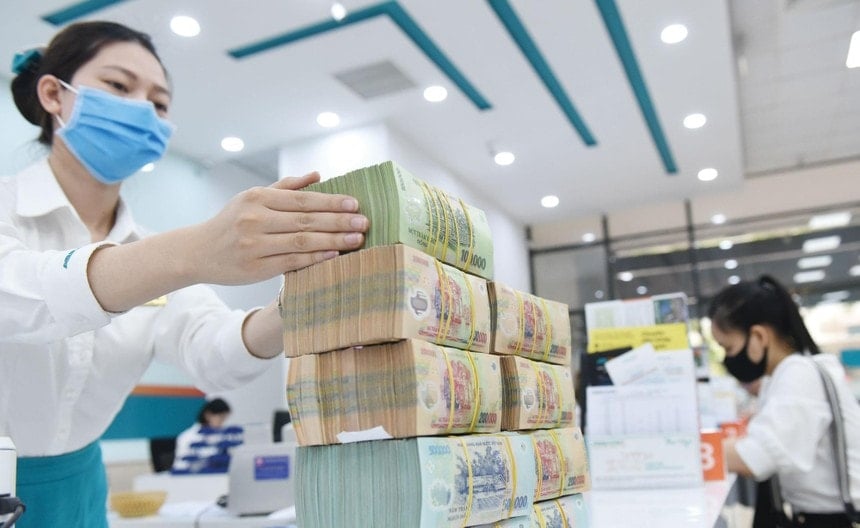Many banks accelerate capital increase plans
Increasing charter capital through retained earnings or issuing additional shares continues to be considered the main trend this year to strengthen financial capacity and serve long-term development plans.
The State Bank of Vietnam (SBV) has recently approved the proposal to increase the charter capital of the National Citizen Commercial Joint Stock Bank (NCB) by VND7,500 billion through the private issuance of shares to professional securities investors. After the successful issuance, NCB's charter capital will increase from VND11,780 billion to VND19,280 billion.
Notably, in 2024, NCB is also one of the banks with the strongest capital increase, from VND 5,600 billion to VND 11,780 billion, putting this bank in the group of 20 banks with the largest charter capital in the system.
Similarly, Asia Commercial Joint Stock Bank ( ACB ) has just been approved by the State Bank to increase its capital by nearly VND6,700 billion through the issuance of dividend shares. According to the plan, ACB will issue about 670 million new shares, equivalent to a rate of 15% (shareholders owning 100 shares will receive an additional 15 shares). This plan has been approved.
The 2025 Annual General Meeting of Shareholders approved and is expected to be implemented in the third quarter. After the issuance, ACB's charter capital will increase from VND44,667 billion to a maximum of VND51,367 billion.
Vietnam International Commercial Joint Stock Bank ( VIB ) is also on the list of banks approved to increase capital this year. Specifically, VIB plans to increase its charter capital by nearly VND4,300 billion by issuing more than 417 million shares to existing shareholders (14%), and issuing more than 7.8 million bonus shares to employees (0.26%). The total charter capital after the capital increase is expected to reach more than VND34,040 billion, an increase of 14.26% compared to the current level.
By early 2025, the total charter capital of 28 domestic commercial banks had exceeded VND 823,500 billion (equivalent to about USD 33 billion), an increase of 15% compared to the end of 2023. The number of banks with charter capital of over USD 1 billion increased from 12 to 15 banks, of which the private joint stock commercial bank sector recorded remarkable growth.
Notably, Techcombank increased its charter capital from VND35,225 billion to VND70,658 billion, rising to second place in the system. VPBank continued to hold the leading position with charter capital reaching VND79,339 billion.
Meanwhile, although the group of state-owned banks accounts for about 50% of the total outstanding loans of the whole industry, the charter capital scale is still behind some private banks. BIDV currently ranks third with 68,975 billion VND, up 21% compared to the previous year. Vietcombank and VietinBank maintain the charter capital of 55,891 billion VND and 53,670 billion VND, respectively.
Several other banks also recorded an increase in charter capital last year, such as MB (VND53,063 billion, up 2%), Agribank (VND51,616 billion, up 25%), SHB (VND38,073 billion, up 1%) and HDBank (VND35,101 billion, up 21%).

Affirming the financial capacity of the bank
In the context that the State Bank of Vietnam (SBV) plans to issue new regulations on capital adequacy ratio (CAR) to increase to 10.5%, banks are forced to proactively prepare capital sources to meet this requirement.
Regarding capital increase options, many banks continue to choose familiar forms such as using retained earnings or issuing securities. According to financial and banking expert, Dr. Nguyen Tri Hieu, increasing capital through retained earnings is a reasonable solution in the current context. At the same time, banks also need to promote capital mobilization through issuing new shares and strengthening financial potential through issuing long-term bonds.
At recent general meetings of shareholders, many banks have had their charter capital increase plans approved by shareholders. For example, SHB plans to increase by about VND5,300 billion through paying dividends in shares. OCB aims to increase its charter capital to VND26,631 billion by issuing shares from equity at a rate of 8%.
TPBank plans to increase by a maximum of VND1,320.9 billion, bringing its charter capital to over VND27,740 billion. MSB plans to issue a maximum of 520 million additional shares to pay dividends. If successful, its charter capital will increase from VND26,000 billion to VND31,200 billion, equivalent to an increase of VND5,200 billion...
In order to serve the economic growth target, the banking sector is expected to expand credit with a growth rate of about 16%. Currently, banks are actively pumping capital into production and business, priority sectors and growth sectors according to the Government's orientation.
Typically, Vietcombank signed a credit contract worth VND5,472 billion for the Lao Cai – Vinh Yen 500kV transmission line project; TPBank provided VND2,500 billion for the Huu Nghi – Chi Lang expressway BOT project...
NCB representative said that the capital raised from the charter capital increase will be used to expand credit for production, business and consumption activities of both individual and corporate customers. Thereby, the bank contributes to promoting credit growth and providing capital for the economy in accordance with the Government's orientation.
At the same time, the capital increase also helps NCB strengthen its financial capacity to achieve dual goals: comprehensive restructuring and transformation according to the new strategy "Digital Wealth" - integrating asset management and digital services.
Many other banks also emphasized that increasing capital is not only to improve competitiveness, but also to help strengthen resilience to market fluctuations, ensuring safe operations and sustainable development in the future.
Source: https://baodaknong.vn/ngan-hang-dong-loat-tang-von-mo-ra-giai-doan-but-pha-moi-252727.html





![[Photo] Prime Minister Pham Minh Chinh and Prime Minister of the Kingdom of Thailand Paetongtarn Shinawatra attend the Vietnam-Thailand Business Forum 2025](https://vphoto.vietnam.vn/thumb/1200x675/vietnam/resource/IMAGE/2025/5/16/1cdfce54d25c48a68ae6fb9204f2171a)























![[Photo] President Luong Cuong receives Prime Minister of the Kingdom of Thailand Paetongtarn Shinawatra](https://vphoto.vietnam.vn/thumb/1200x675/vietnam/resource/IMAGE/2025/5/16/52c73b27198a4e12bd6a903d1c218846)





























































Comment (0)